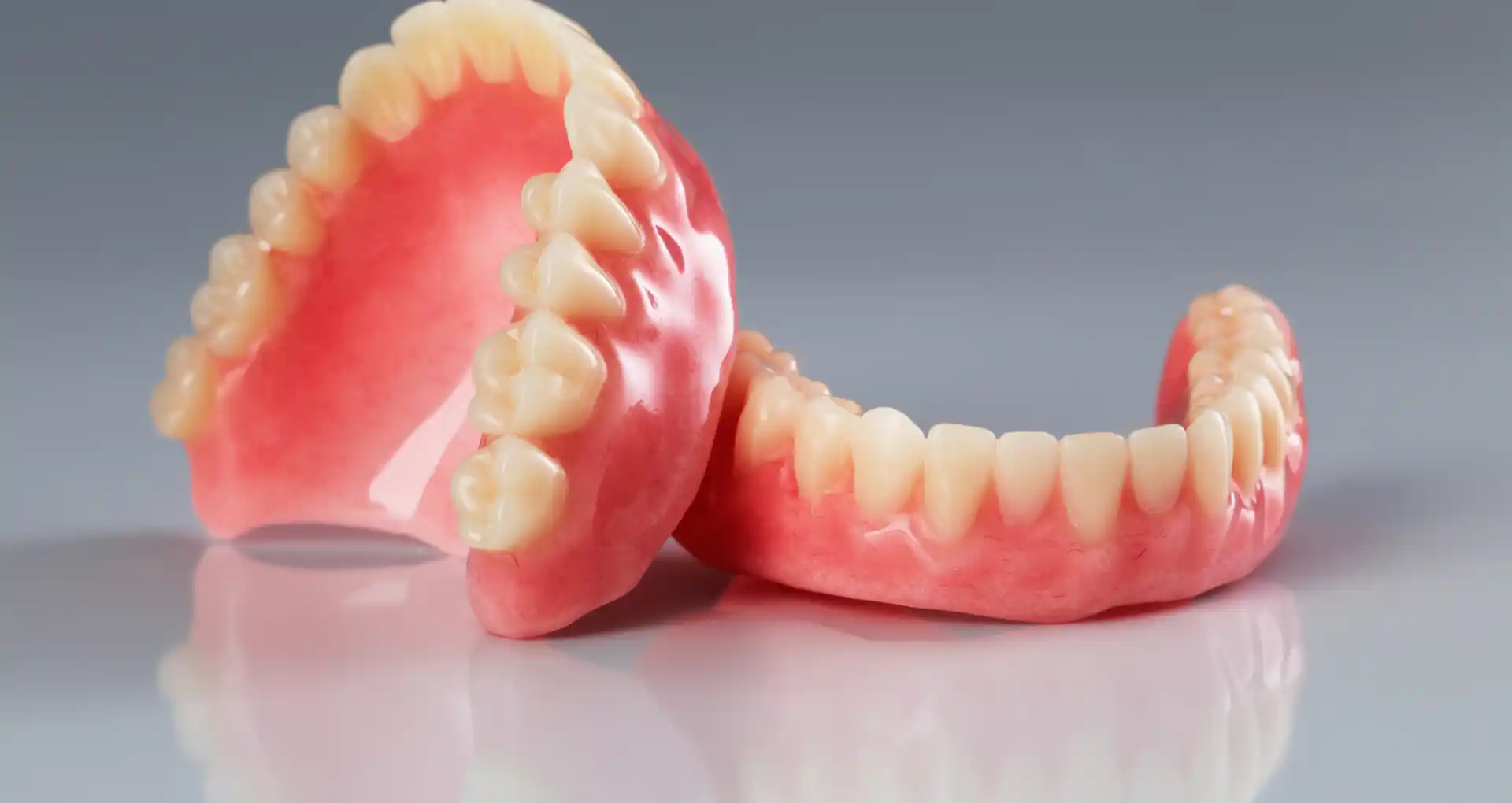Our professional denture repair services are designed to address various issues, from minor adjustments to complex repairs. Our expert team uses cutting-edge procedures and materials to restore your dentures to their original state, providing you with confidence and comfort. We prioritize short turnaround times without sacrificing quality, allowing you to resume your normal schedule with minimal inconvenience.
Maintaining your dentures is vital to oral health and overall well-being. Therefore, we offer comprehensive care tips and follow-up support to prevent future damage and extend the life of your dentures.
Whether you’ve experienced a break, crack, or general wear and tear, our dedicated professionals at Palmetto Family and Cosmetic Dentistry are here to help. Trust us to restore your smile with precision and care.
Understanding Denture Damage: Types and Causes
Dentures are widely used to replace missing teeth, providing functional and aesthetic benefits. However, like natural teeth, they are susceptible to damage over time. Understanding damage kinds and their causes is essential for prolonging the life of dentures and maintaining oral health.
Here are the most common types of denture damage and their causes:
Types of Denture Damage
- Cracks and Fractures: These can range from minor surface cracks to complete fractures through the denture base or teeth. Cracks may develop slowly over time or suddenly due to a specific incident.
- Wear and Tear: Dentures are subject to daily wear, which can lead to the teeth becoming worn down, affecting the denture’s fit and function. Excessive wear may also alter the appearance of the dentures, making them look less natural.
- Staining and Discoloration: Similar to natural teeth, dentures can become stained or discolored over time. This can be due to the consumption of certain foods and drinks, smoking, or inadequate cleaning.
- Fit Issues: Over time, the shape of the mouth and gums changes, leading to dentures that no longer fit properly. Ill-fitting dentures can cause discomfort, sores, and even damage to the gums and mouth.
- Chipping: The teeth on dentures, especially those made from acrylic, can chip if subjected to hard foods or if dropped.
Causes of Denture Damage
- Impact Damage: Dropping dentures onto a hard surface or subjecting them to forceful impact can cause immediate and visible damage, such as cracks, chips, or fractures.
- Improper Care: Not following proper denture care instructions, including daily cleaning and soaking, can lead to a buildup of plaque and tartar, staining, and even more severe damage from bacterial growth.
- Natural Wear: Just as with natural teeth, denture materials can wear down over time due to the constant forces of biting and chewing.
- Poor Fit: Continuing to wear dentures that no longer fit properly causes discomfort and can lead to uneven pressure distribution, contributing to cracks and fractures.
- Chemical Damage: Using harsh chemicals or incorrect cleaning solutions can damage the materials of the dentures, leading to surface damage and weakening of the structure.
- Thermal Shock: Exposing dentures to extreme temperature changes, such as hot water for cleaning, materials may expand and contract, causing cracks or warping.
Preventing denture damage involves proper care, regular dental check-ups, and being mindful of dentures’ limitations. If damage does occur, it’s essential to see a dental professional for repair or replacement to avoid further oral health issues.
The Repair Process: What to Expect
When it comes to denture repair, understanding the method can ease anxieties and provide a smooth experience. Here’s an overview of what to expect during the denture repair process:
- Assessment: The first step involves a thorough evaluation of the denture damage. We’ll examine the denture to determine the extent of the damage and the best course of action for repair.
- Discussion: After completing the assessment, your dentist will discuss the repair options with the patient. This may include explaining the repair techniques, estimated costs, and the timeline for the repair process.
- Repair Options:
- In-House Repair: Minor repairs, such as small fractures or adjustments, can often be completed in-house during a single visit. We have the tools and materials necessary to perform these repairs on-site.
- Laboratory Repair: The dentures may need to be sent to a dental laboratory for more complex repairs or extensive damage.
- Timeline: The timeline for the repair process varies depending on the nature of the damage. In-house repairs may be completed within a few hours, while laboratory repairs may take several days to a week.
- Fit and Function: After the repair, we ensure that the dentures fit correctly and function as intended. This may involve adjustments to guarantee comfort and functionality.
- Post-Repair Care: Patients receive guidance on post-repair care, including instructions for cleaning, maintenance, and any precautions to prevent future damage.
- Follow-Up: Sometimes, a follow-up appointment may be scheduled to ensure that the repaired dentures meet the patient’s needs and expectations.
By understanding these steps, you can confidently approach the denture repair process, knowing what to expect and how to care for your dentures post-repair.
Beyond Repair: When to Consider Denture Replacement
When it comes to dentures, knowing when to replace is essential for sustaining oral health and overall comfort. Here are signs to look out for:
- Looseness or Falling Out: If dentures feel loose or frequently fall out, it may be a sign that they no longer fit properly, prompting replacement.
- Difficulty Speaking: Difficulty speaking clearly can indicate that the dentures are not providing the necessary support and stability, signaling a need for replacement.
- Discomfort and Pain: Any discomfort or pain while wearing dentures could be a sign of ill-fitting or worn-out dentures, warranting consideration for replacement.
- Denture Wear and Tear: Over time, dentures naturally wear out, leading to discoloration, damage, or a generally unnatural appearance, indicating the need for replacement.
Understanding these signs can help you make informed decisions about denture replacement, ensuring continued oral health and comfort.
Maintenance Tips: Prolonging the Life of Your Dentures
Here are some essential maintenance tips that can help you prolong the life of their dentures:
- Daily Cleaning: Regularly clean dentures by gently brushing them with a soft-bristle brush, and non-abrasive dentures are more hygienic to remove food particles, plaque, and bacteria. It’s important to avoid ordinary toothpaste since it can abrade dentures material.
- Handle with Care: When cleaning or handling dentures, it’s crucial to do so over a soft surface or a filled sink to prevent breakage in case they’re dropped. Avoid using hot water, which can warp the denture material.
- Rinsing After Meals: Rinse dentures to remove any food debris after eating. This simple practice can help prevent staining and plaque buildup.
- Regular Dental Check-ups: Schedule routine dental appointments for check-ups and professional cleanings. This allows us to assess the condition of the dentures and address any fit or maintenance issues.
- Proper Storage: When not in use, store dentures in either denture cleaning solution or just water to keep them from getting dry and distorted.
- Avoid Harsh Chemicals: Refrain from using bleach or other harsh chemicals for cleaning, which can damage the denture material.
Following these maintenance advice can extend the longevity of dentures and ensure continued comfort and functionality.
Ready for Denture Repair? Contact Us Today!
If you’ve been following our maintenance tips but still find your dentures need repair, don’t hesitate to contact us at Palmetto Family and Cosmetic Dentistry. Our experienced team is well-equipped to address any denture repairs or adjustments you may require, ensuring your smile remains seamless and comfortable.
Contact us today to schedule an appointment and get your dentures looking and feeling new again.

